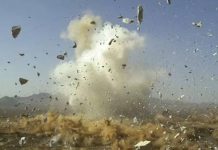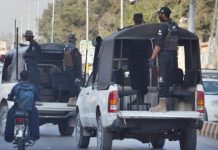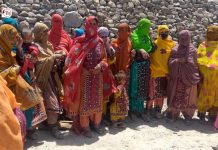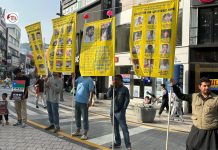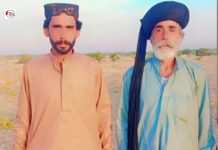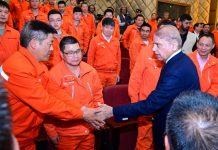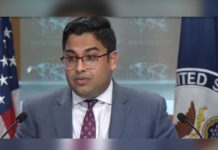The Baloch Liberation Army (BLA), a pro-independence organization, has released a 27-minute video message from its leader, Bashir Zeb Baloch, on its media channel, Hakkal. The video, primarily in the Balochi language, features Bashir Zeb alongside several armed fighters equipped with modern weapons and dressed in military gear.
The video showcases various units of the BLA, identifiable by unique uniforms and badges, including the Majeed Brigade, Special Tactical Operations Squad, and Fateh Squad. Strikingly, the video also features female fighters within the ranks of the BLA Majeed Brigade, signaling broader participation in the armed struggle.
Bashir Zeb Baloch started his address by explaining their choice of armed resistance as a necessary response to perceived colonial oppression by Pakistan. If Pakistan has established control through force, tyranny, and brutality, it can be halted with the same, he reasoned. Peaceful protests and pleas, he argued, are ineffective against Pakistan’s oppressive rule.
Drawing on the admission of powerlessness by Pakistani Parliament members, Baloch argued “The enemy is proving our ideology true by their actions that violence can only be ended with violence”
He reasoned that the same force used by Pakistan to assert control could also be used to resist and counter their authority. He portrayed the ongoing struggle as a “necessary defensive position” against the force and tyranny of Pakistan, and not an act of desire.
Baloch went on to argue that the countries today admired for their civility and democratic values achieved their status through extreme periods of war and armed struggle. Baloch stressed the need to escalate their armed struggle to such extremes to make their voices heard.
Bashir Zeb Baloch cited the example of Ukraine to emphasize the necessity of armed struggle to gain global attention and support, stating, “Ukraine defended themselves after reaching the brink of destruction from war, and the world helped them.”
Baloch commented on the perceived ineffectiveness of their suffering in gaining international attention. He urged that global and humanitarian laws should not be interpreted according to personal biases or desires. He argued that tactics such as suicide attacks, hand grenades, and the use of Kalashnikov rifles are all parts of an armed struggle, not to be singled out for criticism. He justified this stance by stating that these means have been utilized globally in various conflicts.
The BLA leader stressed that while they hate war, they acknowledge that peace often emerges from it. He claimed readiness for negotiations, but only if it involves discussing Balochistan’s freedom. To bring the conflict to the negotiating table, he suggested an intensification of the armed struggle, a war effective enough to command attention.
The leader of the BLA stated that war cannot be fought in a civilized and genteel manner. He suggested an intensification to the point where people from Islamabad, Punjab, Rawalpindi, Lahore, and Gujranwala would protest against the war in Balochistan, putting pressure on Pakistan to cease hostilities.
Baloch refuted the critique of involving women in their struggle, asking “Why shouldn’t they be involved?” and “Which traditions are we violating?” He enumerated historical instances of women’s significant participation in wars, pointing to women’s roles, such as Ganjan Bibi, the wife of martyr Khan Mehrab Khan, in Baloch history. In this regard, he stated that the argument against female involvement in the conflict was an “enemy” narrative and was subsequently being propagated by some of their own(Baloch) either intentionally or unintentionally.
Baloch vehemently rejected, what he calls the “enemy’s narrative” that involvement in the war would lead to abductions, particularly of women, students, engineers, doctors, teachers, political workers, scholars, and tribal pillars. He questioned, if all these groups were exempted from the war due to fear of abduction, then who would be left to carry forward this struggle?
Moreover, the BLA chief referred to Islamic traditions where women played significant roles in wars, citing the Sahabi Sabiha as an example. He then moved onto the international arena, highlighting key female figures in global conflicts such as Winnie Mandela, Semiram Kurd, Leila Khaled, and Jamilam the Algerian, arguing that there was no gender difference in the face of a struggle for survival.
Addressing the issue of language and culture, Baloch issued a stern warning for those working against their languages: Balochi, Brahui, Jadgali, Khetrani, Dehwari, Lasi. He argued that their struggle wasn’t merely a political one but also a fight for the preservation of their linguistic and cultural identity.
Referencing Saba Dashtiyari, a prominent Baloch scholar and intellectual who was assassinated in 2011, Baloch conveyed that Dashtiyari had proved his love for his homeland and language through his actions and ultimate sacrifice. The BLA leader argued that mere display of cultural symbolism does not signify patriotism unless it is accompanied by active support for their struggle against an occupying force.
Bashir Zeb Baloch asserted that other means of protest, including human rights advocacy and surface politics, are not dismissed by them. However, he underlined the belief that their main solution lies in their ongoing armed struggle. He mentioned that diplomacy, for them, simply means acquiring enough power to engage in negotiations with the world on their own terms and that their current situation doesn’t allow for effective diplomacy.
He clarified their interpretation of diplomacy, stating it to be the capacity to negotiate with the world on an equal footing, to voice their wants, and discuss mutual interests. In Baloch’s words, diplomacy is not mere charity or an expression of desire, but a tangible gain of support.
Baloch acknowledged the magnitude of the tyranny and injustice inflicted on Balochistan. However, he pointed out that the world’s civilized and human-loving societies would not address their plight unless it aligned with their interests.
Baloch reiterated his commitment to a scientifically and intellectually solidified war. He indicated respect for differing aspects of their struggle and readiness to engage in logical debates around it.
The BLA leader further critiqued those who advocate for human rights, democracy, and surface rights, accusing them of knowing that war is the solution yet opposing it, intentionally or unintentionally. He alleged these entities of furthering the state’s narrative.
Addressing the concerns about casualties, Baloch compared the deaths in their war to those in gang wars, implying an inevitable sacrifice. He foresaw a time when the oppressions of the past would be forgotten, both by them and their enemy.
In his closing remarks, the BLA leader expressed a commitment to limit harm to civilians in their struggle and acknowledged that this consideration has often prevented them from achieving many significant targets.











